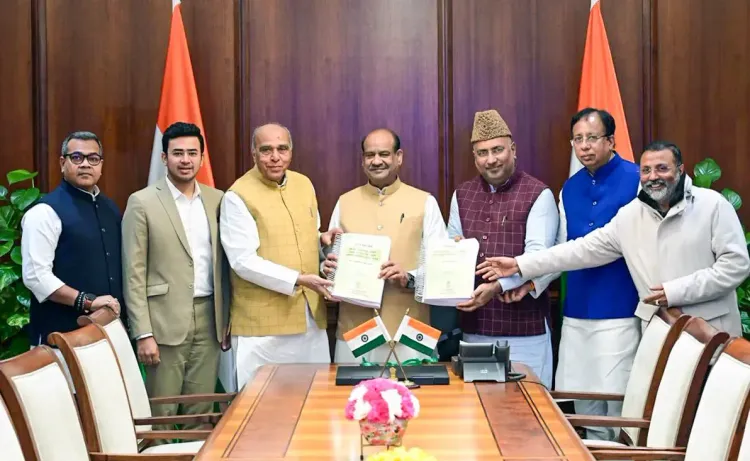JPC's Waqf Amendment Bill Report to Be Presented in Lok Sabha on Monday

Synopsis
Key Takeaways
- Report to be tabled in Lok Sabha.
- 14 amendments approved by the JPC.
- Controversy surrounding the Bill's impact on Muslim rights.
- Opposition claims Bill undermines Waqf autonomy.
- BJP defends Bill for promoting transparency.
New Delhi, Feb 1 (NationPress) The report from the Joint Parliamentary Committee (JPC) that reviewed the Waqf (Amendment) Bill is scheduled to be presented in the Lok Sabha on Monday.
As stated in a bulletin from the Lok Sabha Secretariat, Committee Chairman Jagdambika Pal alongside member Sanjay Jaiswal will introduce the report in the House.
The committee had previously submitted the report to Lok Sabha Speaker Om Birla on Thursday.
This report, which was accepted by the committee on Wednesday, encompasses amendments suggested by members of the ruling NDA. The evidence record submitted to the Joint Committee regarding the Bill will also be presented.
On Wednesday, the JPC on the Waqf Amendment Bill approved the Bill's draft, which incorporates 14 amendments put forth by members of the BJP-led National Democratic Alliance (NDA).
The JPC Chairperson confirmed that these amendments were adopted via a majority vote, with 16 members backing the changes and 10 opposing them.
“A comprehensive discussion on 44 amendments was conducted clause by clause. After six months of thorough deliberations, we collected suggestions from all members. This was our concluding meeting. The committee accepted 14 amendments through majority vote. Although the Opposition proposed amendments, they were dismissed with 10 votes in favor and 16 votes against,” Pal informed reporters.
The Waqf Amendment Bill aims to reform the Waqf Act of 1995, which governs the management of Waqf properties in India.
This Bill has sparked considerable controversy, with opposing parties asserting that it compromises the rights of the Muslim community and threatens India's federal structure.
The Opposition has accused the ruling party of leveraging this Bill to undermine the autonomy of Waqf boards and violate the constitutional rights of the Muslim populace.
Opposition MPs have characterized the amendments as a maneuver to control the management of Waqf properties and dismantle the boards.
Conversely, BJP members advocate for the Bill, claiming it seeks to introduce modernity, transparency, and accountability in managing Waqf properties.
They argue that these amendments are vital for ensuring the effective operation of the boards and curbing misuse of Waqf assets.
The report, which will be introduced in Parliament on Monday, is poised to provoke further discussion, as the Bill and its stipulations are expected to be deliberated.









